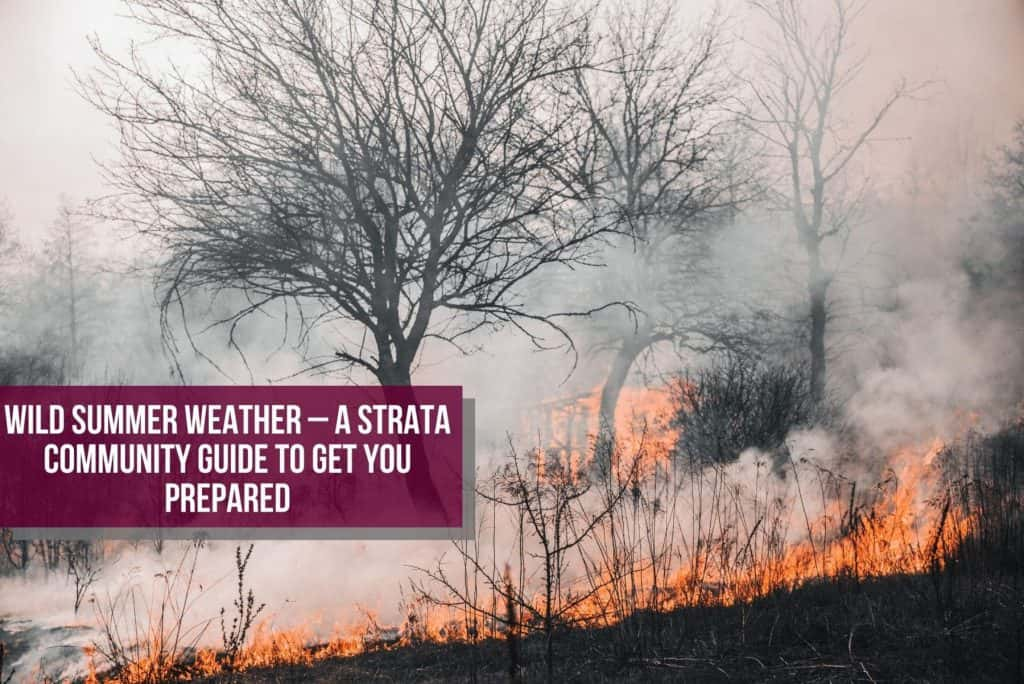
Mail and package thefts – how to deliver security to your building
December 1, 2020
A summer like no other on a strata balcony: things to remember
January 25, 2021
Mail and package thefts – how to deliver security to your building
December 1, 2020
A summer like no other on a strata balcony: things to remember
January 25, 2021Bushfires, wild wind and rain, storms and flooding - summer certainly dishes up a wide array of headaches for strata owners and communities alike.
So what’s on the horizon for this summer?
A word from the experts
Weather forecasters are warning the Owners Corporation that this summer’s La Nina is likely to cause some chaos, and to make sure their insurance is up to date to cover any damage and ensure safety of the common property.
While La Nina is likely to bring a welcome relief from the danger of bushfires, especially after the calamities of 2019 and early 2020, there could be a host of other difficulties regarding strata safety.
“This summer, particularly for NSW, Victoria and Queensland, there are high odds of higher-than-average rainfall and we are concerned about an increased risk of flooding,” said climatologist Andrew Watkins, head of operational climate services at the Bureau of Meteorology.
What it means for you
1. Insurance
Wild weather has a host of implications for insurance policies, so now is the perfect time to run a health check on your insurance cover.
Every strata owner and strata community should be using this moment at the start of the new year to review their current policy and understand whether there are any gaps, or whether the sum insured should be increased to match growing weather threats.
A policy you signed up for years ago may not address renewed weather threats to your region so take the time to check if you’ve got the strongest cover.
In addition to checking the quality of your cover, it’s also timely to research the availability of certain policies in your regions.
The last few years of severe weather events have had an impact on both the cost and availability of insurance in some regions.
Ace is aware of communities in North Queensland that have seen premium increases as high as 30 per cent following the 2019 floods — in addition to several regions where many insurers have pulled out of the market.
Before the summer of wild weather kicks off, get the right policy and team behind you.
2. Maintenance checks
Failed maintenance can exacerbate weather events. Broken gutters can lead to water drainage issues. Drainage issues to water damage and water damage to several others.
It’s a vicious domino effect that can leave communities and owners out of pocket tens of thousands!
If you’re searching for a place to start, follow these tips
Survey the common property areas - If there are trees close to your home, be aware that they could be a potential risk of damaging your house or roof during a wild storm. It may be worth having a chat in your strata community about trimming trees and limiting potential risks.
Secure your belongings - Pot plants on your balcony? What about chairs and furniture in the courtyard? In case of storms, the first thing you should do is ensure your home is as secure as possible and that means tying down or relocating these items to the indoors.
Check the roof, gutters - The gutters are your home's first line of defence to protect against leaks, so don't forget about them. Gutters should be checked regularly but even more so before a storm to ensure they are clear of any debris or obstructions to avoid water overflowing into the eaves of your roof.
Check the boundaries – fences, windows can be your best defence against wild weather, so their strength and integrity is your concern. This is a job to call in the professionals for. Hire a licensed handyman to install or repair your hinges and locks on your doors and windows.
3. Governance
The worst version of wild summer weather also holds some implications for strata communities at a governance and committee level.
Are emergency plans in place to keep residents safe in power outages?
How about evacuation plans in case of extreme weather?
It’s a good time to review what contingencies are in place to keep your community safe.
With respect to power outages in South Australia, Ace has heard of communities investing in backup generators and emergency lighting in common spaces.
Likewise, in areas where bushfires are prevalent, we’ve applauded communities who have invested in bushfire alert emails and communications, aimed at keeping residents informed with dangerous weather about.So what needs to happen? It depends on your region and relevant laws, but talking to a qualified strata manager can help identify any areas that need urgent attention and action. There are also different laws applied, depending on whether you hire a worker or have a contractor do the repairs and maintenance for you.
Normally, strata title bodies corporate of wholly residential strata schemes are not covered by the Work Health and Safety (National Uniform Legislation) Act 2011 and Regulations 2011, unless they directly employ a worker. However, each state has their own work health and safety regulation, and under certain circumstances the strata title bodies corporate have to comply with the work health and safety legislation.
Seeking further advice?
If you wish to discuss any strata community matters further with an Ace Body Corporate manager, please do not hesitate to contact us by visiting our contact page and locating your nearest Ace manager for a chat.
www.acebodycorp.com.au


